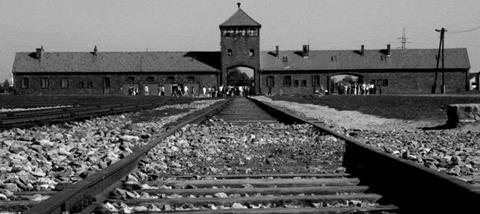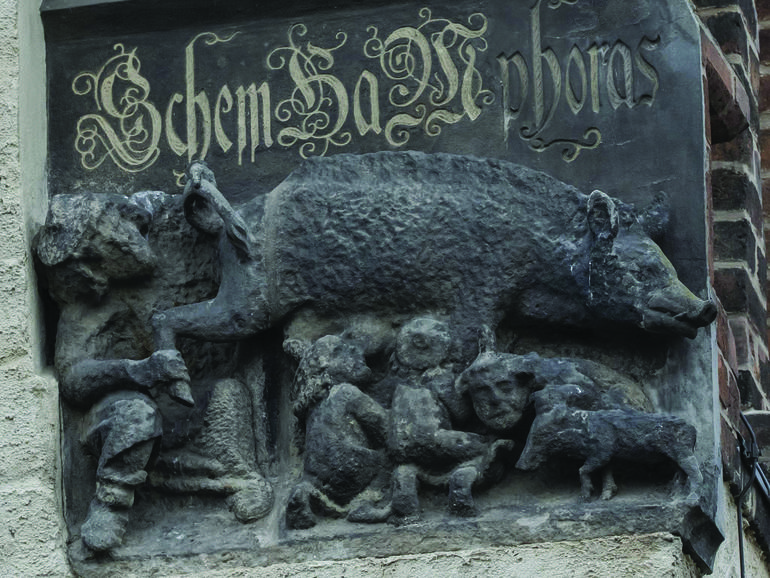On Holocaust Memorial Day, Simon Ponsonby exposes the ‘Christian’ roots of the worst massacre in modern history

Knowing that I was a priest, a Jewish graduate scholar at Oxford once told me she grew up believing that if she were to look at a crucifix she would die. Where on earth would she get an idea like that? I wondered if it came from a long-forgotten memory programmed in her psyche, passed from generation to generation, reinforced by trauma, that churches are dangerous places for Jews.
The idea is not as unreasonable as one might first think. For centuries the Church forgot it was birthed in the synagogue. Those who lived under the cross often neglected their roots, passing over the fact that their scriptures, apostolic saints and even their own saviour was Jewish. For hundreds of years, the Church imposed separations, restrictions, extortions, expulsions and persecutions on Jews. So-called pogroms often occurred on Christian Holy-days, and such atrocities culminated in the Holocaust.
While the Holocaust was by no means Christian, the shocking truth is it could never have happened without the centuries of Church persecution of the Jews which came before it and a theology that demonised them.
‘Holocaust’ is a word derived from two Greek words meaning ‘burnt whole’. It is the term employed (along with the Hebrew Shoah meaning ‘catastrophe’) to describe the Nazi’s murder of 6 million Jews – nearly two-thirds of Europe’s total of 9.5 million. The Jews were not alone in their suffering. The Nazis also murdered 2,000 Jehovah’s Witnesses, 15,000 gay people; 100,000 physically and mentally disabled, plus 200,000 Gypsies and innumerable Poles.
Nazism was discriminatively evil, but always the particular object of their hatred, the motivating factor for industrialising death, was the despised Jews. Before the death camps were conceived, more than 1 million Jews were murdered by bullets in the Ukraine: in forests away from sight, and in the Ghetto streets in full view.
Demonic influence
How can we comprehend such evil? It seems to defy analysis. But analysis is necessary and reveals a complex matrix of interconnecting factors in early 20th-century Germany that created the perfect storm to host a malevolent spirit. The first three were political and cultural, but the fourth was theological.
Firstly, there was a rising fetish with German identity, manifest in an idealised mythology of Aryan Volkism and a disdain for any element tainting the purity and prowess of the true German Blut und Boden – Blood and Soil. This proud martial nation had been humiliated by losing the First World War. The Jews were very early scapegoats.
Secondly, German anxiety was triggered by the rise of Bolshevism in the East, which was perceived as a real political threat and, importantly, a Jewish movement.
Thirdly, there was crippling German poverty following the war, that saw the hungry dying in the city streets. Resentment grew at the perceived wealth of the Jews.
Fourthly, Nazism tapped into the previous 1,800 years of Church theology in order to bolster its antisemitic doctrines. In fact, every one of the Nuremberg discriminatory laws against the Jews had precedence in earlier Church council rulings and actions.
Of course, none of this really explains why the Nazis undertook systematic murder of European Jews. Most of these Jews were the antithesis of the rich and powerful industrialist or banker caricatured in Nazi propaganda.
I believe the real motivating factor in the Holocaust was the demonic. An antisemitic, antichrist spirit took root – stealing, killing, destroying. The targeted object was the people carrying the promises to Abraham, Isaac and Jacob, who remain the apple of God’s eye.
Luther's antisemitism
After years of studying this history, one Church figure stands out as preparing the ground and sowing the seed for Germany’s antisemitism: the reformer Martin Luther. He wrote several treaties against the Jews; the worst, but least known, is Vom Schem Hamphoras (1543), or The Ineffable Name, a blasphemous work that mocked the Jewish reverence for Yahweh’s sacred name. In it Luther claimed that the Jews found the name for God up the backside of a sow – a familiar medieval motif called Judensau, a plaque of which still remains on the wall of his former church in Wittenberg (see page 37). SS soldiers enjoyed photographing themselves proudly beneath it.
Luther’s most infamous and influential work was On the Jews and Their Lies (1543). This is a substantial work of 65,000 words of sustained invective against the Jewish people. He describes them as: “A defiled bride…an incorrigible whore and an evil slut”; “blood thirsty bloodhounds and murderers of all Christendom”; “stiff-necked, disobedient, prophet-murderers, arrogant, usurers, and filled with every vice.”
And then there is this: “Even if they were punished in the most gruesome manner that the streets ran with their blood, that their dead would be counted, not in the hundred thousands, but in the millions…they are the devil’s children, damned to Hell...” Prescient or precipitous?
Luther goes on to ask: “What shall we Christians do with this rejected and condemned people, the Jews?” His answer was systematic: “First, set fire to their synagogues or schools…Second, I advise that their houses also be razed and destroyed. Third, I advise that all their prayer books and Talmudic writings, in which such idolatry, lies, cursing, and blasphemy are taught, be taken from them. Fourth, I advise that their rabbis be forbidden to teach henceforth on pain of loss of life and limb...Fifth, I advise that safe-conduct on the highways be abolished completely for the Jews. For they have no business in the countryside...Sixth, I advise that usury be prohibited to them, and that all cash and treasure of silver and gold be taken from them… Seventh, I recommend putting a flail, an ax, a hoe, a spade, a distaff, or a spindle into the hands of young, strong Jews and Jewesses and letting them earn their bread in the sweat of their brow…if we are afraid that they might harm us or our wives, children, servants, cattle, etc…then let us emulate the common sense of other nations such as France, Spain, Bohemia, then reject them forever from the country.”
It is claimed Luther was merely a man of his time, and not an antisemite (a modern construct), merely anti-Judaic: the religion not the people being his aim. Rubbish. Re-read the quotes above and tell me they are not racist and antisemitic. Read them to a Jew and tell them it’s Judaism not Jewishness that Luther targets.
William Temple, in 1941, as Archbishop of York, stated: “It is easy to see how Luther prepared the way for Hitler.” It may not be that simple, but unquestionably the dark anti-Jewish animus in Luther, building on centuries of Church antisemitism, laid a foundation for the Holocaust.
The distinguished Prof Diarmaid MacCulloch claimed that On the Jews and Their Lies was the blueprint for Kristallnacht, which occurred on the fateful day of 10 November 1938. The timing was carefully choreographed, as this day was Luther’s Public Birthday – a German holiday celebrating German identity. It turned into a pogrom, named ‘crystal night’ due to the smashed glass of the 815 Jewish shops that littered the streets. Jewish authored literature was burned on bonfires publicly; 181 synagogues were razed to the ground; Jews were attacked and humiliated in the streets and 30,000 Jewish men rounded up and sent to concentration camps. And the bill for the clean-up of the operation was demanded from the Jewish community. They were made to pay for their sufferings.
Immediately following Kristallnacht, the Bishop of the Evangelical Lutheran Church in Thüringia, Martin Sasse, swooned that Luther couldn’t have wished for a more beautiful birthday gift. Two weeks later he printed 100,000 copies of a collection of Luther’s antisemitic quotes, celebrating Luther as “the greatest antisemite of his time, the warner of his people against the Jews”.
Luther, the great reformer, the most significant figure in German history, unquestionably put fuel on the Holocaust fires – and many within and without the Church looked to him for moral justification.
Where was the Church?
Certainly some Christians bravely protested or preached against the Nazis – too few, too little, too late. Most were intimidated into silence. Those who spoke up or who helped hide, protect or get to safety a few Jewish people were arrested and sent to Dachau and Sachsenhausen concentration camps.
And tragically, many German Christians supported what was going on – if not wholeheartedly, then by their passivity. Even if, as some claim, they were only vaguely aware of whispers of horror coming from Poland or Belorussia, and later names like Auschwitz, Treblinka and Belsen, they all knew how the Jews in Germany and Austria had been treated for a decade before, in front of their very own eyes.
I recall one account of a Christian, deeply ashamed about how she could hear the screams and cries for help from the cattle trucks passing by the station, situated next to their church even as the congregation gathered in worship. What did they do? They sang their songs of Zion even more loudly to drown out the discomforting sounds of suffering.
We may ask: “Where was God?” Let us not seek a slick theodicy. Stand silent, transfixed and appalled before the Holocaust and by all means ask searching questions of God, but more so of humanity. I believe the Holocaust was an assault on God. An attack on the people made in his image, and on people who were particularly his first covenant people and heirs of promise.
And yet even in the horror, there is a strange hope. God has not been overcome; God is working out his purposes. Joseph said to his brothers who had sold him into slavery: “You intended to harm me, but God intended it for good” (Genesis 50:20).
The Holocaust decimated the Jews of Europe and part of that was a satanic attempt to stop the prophetic clock ticking towards Jesus’ return and reign, and rout of evil. As Britain received the mandate to make a homeland for the Jewish people, and as the Zionist impetus to return to the land became a growing reality, so scriptural prophetic fulfilment came into focus and the demonic made a pre-emptive strike, one that would backfire and hasten the return of the Jews.
But what the Nazis intended for harm, incited by the demonic, God redeemed for good. Following the Holocaust, for the briefest window in history, there was worldwide compassion for the Jews and a consensus that they should be aided to return to their ancestral homeland. A new Exodus brought the Jews home. The land was renamed ‘Israel’ in 1948. Many see that as fulfilment of biblical prophecy – their return to the land, preceding their return to the Lord, and then the Lord’s return.
What should our response be?
1. Confession. The Jewish people have long-scarred memories. They rightly do not pass lightly over centuries of persecution at the hands of Christians. The Church must repent of the atrocities committed by her, in Jesus’ name, and of walking on the other side of the road when the Jewish people needed help.
2. Benediction. Israel is the root that supports the branches of the Church (Romans 11:16-18). We who have received spiritual blessings owe the Jews material blessings and Paul specifically encourages us to be generous to the Jewish people in gratitude for the gospel (15:27).
3. Intercession. Let us pray for forgiveness. Let us pray that God roots out every trace of antisemitism. Let us pray for the protection of the Jewish people. Let us pray for “the peace of Jerusalem” (Psalm 122:6).
4. Identification. With antisemitism on the rise in the West, let us stand with our ‘older brother’ – and let us speak up for Jewish people and defend and befriend them.
5. Education. Christianity is a Jewish sect – our apostles were Jewish, our scriptures are Jewish, our faith was nurtured in Israel, our God is the God of Abraham, Isaac and Jacob, and our saviour and King is a Jewish man. The Church must study her Jewish roots, looking to the rock from which she was hewn (see Isaiah 51:1). The Church also needs to study eschatology and discover God’s purposes for Israel in the end times.
6. Mission. The gospel is “for the Jew first” (Romans 1:16, NKJV) and last. If we love Jesus, the King of the Jews, we must love the Jewish people, we must seek to share their Messiah with them. Professor Douglas Moo says: “Refusal to preach the gospel to Jews is anti-Semitic.” But we must be so sensitive to the centuries of harm done in Jesus’ name and we must overcome the innate suspicion and fear of the Jewish people towards Christianity with kindness, advocacy and friendship, in order to find a way of presenting Jesus the Messiah as the fulfilment of their Jewishness, not the abandonment of it.
Recently, a woman came up at the end of our service and said: “I am Jewish, but I feel safe in this church.” That is a miracle given the Church’s record. May it become normal in our day.
Holocaust Memorial Day is marked on 27 January. For more information visit hmd.org.uk


































